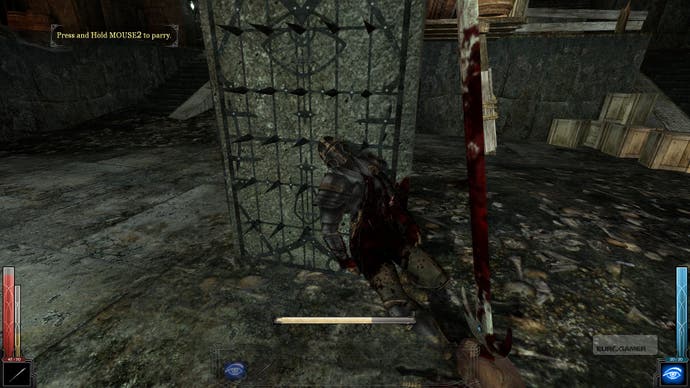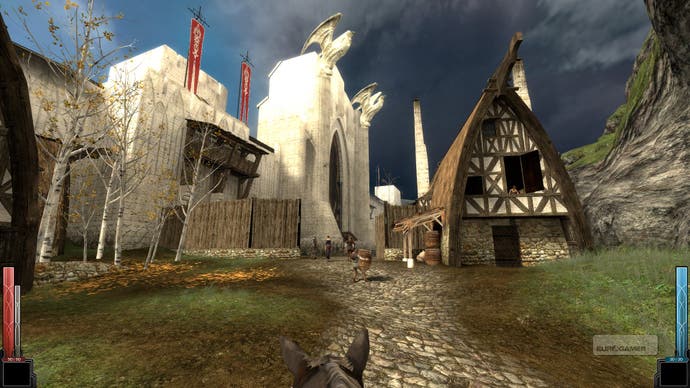Retrospective: Dark Messiah of Might and Magic
Boot to kill.
Although they're completely different games, it's hard not to keep Mirror's Edge from your mind while playing. They were a few years apart, but the basic physicality of the game, finally feeling like you're actually in a world rather than just interacting with it, is hard to shake. Being able to see your character's body in the first person is a woefully undervalued feature, but beyond that, it's being able to pick things up, climb up ledges, and more importantly, kick anything that looks even remotely flimsy.
There's a rooftop chase in the first hour or so of the game that drives this feeling immediately to mind, where you're leaping and scrambling your way across tile roofs, barely holding on half the time, with poorly constructed wooden supports collapsing left and right. It's the perfect antithesis to the previous level, where you've been on the run, desperate to get to safety before you get eaten by a great undead Cyclops.
All this considered, Dark Messiah is a game of moments rather than a sustained marvel. It's about slipping away from the corridor for a moment and finding a weirdly abandoned smithy, letting you smelt iron into a blade then temper it and finally add a hilt. This isn't just a crafting bar that fills up, it's a surprisingly in-depth action. Put the raw iron in the pot, pump the billows, pour the molten metal into the mould, flood it to cool. That sort of thing.
It's about the sudden, unexpected nod to A New Hope, with the walls closing in. There's no droid in a command centre somewhere, blipping and blooping their way to saving you, and so you've got to figure out how to save yourself from being crushed. The answer, as always, lies in your interaction with the world and using the systems you've already figured out in your favour.

There are bad moments, too, and they're mostly spider-based. It's one of the most tired fantasy clichés, and because it's so very often tied to poison, as it is here, it's one of the most frustrating, too. It's rarely any fun at all to watch your health bar diminish because you've not got any more antidotes, only for the poison to dissipate when you've got just a sliver left, ready for the next light gust of wind to finish you off.
The story itself is a surprisingly shallow attempt to justify the movement from one location to another and while the design of each location is often beautiful, the lack of any real narrative momentum can make things falter a little; wanting to know what happens next is rarely your incentive to carry on playing.
Instead, what drives you back is the compelling ebb and flow of things to do. You're almost always either fleeing some greater force or infiltrating some grand complex. The way you build your character feeds into that, as well, with stealth being the obvious option, but even going the warrior path makes you feel like some sort of fantasy commando, dispatching those he comes across with efficiency but not a huge amount of fuss.

It's a dungeon-crawler, but in the way that we all imagined dungeon crawlers to be when we first heard of them. Traps all over the place. Goblins, orcs, spider caves. Floors that suddenly collapse underneath you, sending you off on some unexplored, unexpected detour. Betrayal from someone you obviously knew was going to betray you because they sound like a sadistic nymphomaniac. Sure, it's linear, but whatever sacrifice has been made on that front has been to place you deeper in the world, make sure that you realise that you're there and not here.
It all comes back to that boot. Thankfully, the boot hasn't become a footnote in the graveyard of great ideas. It may have started with Duke Nukem 3D, but that was hardly its ending. Bulletstorm was all but a love song to the boot. Dead Island makes it a necessity for staying alive. Mirror's Edge, Crysis 2, Brink...
The question then arises: what exactly did Dark Messiah do to differentiate its boot from those of other boots? It's what you're allowed to boot into. I'm coming back to that idea of being in a game world rather than just interacting with one. Boot to man, man to rack of spikes. Boot to man, man to ledge, man over ledge and screaming to his death. It's Newton's second law in glorious, virtual motion, writ large across your monitor.
Sure, your gun can make guys' heads explode - but my foot can make them fly.








